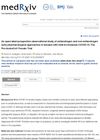Early COVID-19 Therapy with Azithromycin Plus Nitazoxanide, Ivermectin, or Hydroxychloroquine in Outpatient Settings Significantly Reduced Symptoms Compared to Known Outcomes in Untreated Patients
November 2020
in “
bioRxiv (Cold Spring Harbor Laboratory)
”

TLDR Early treatment with azithromycin and other drugs reduced COVID-19 symptoms and complications.
In a prospective, open-label observational study, early treatment of mild-to-moderate COVID-19 patients with azithromycin combined with nitazoxanide, ivermectin, or hydroxychloroquine showed significant improvements compared to untreated patients. The study reported a 31.5-36.5% reduction in viral shedding, a 70-85% reduction in symptom duration, and a 100% reduction in respiratory complications. For every 1,000 COVID-19 cases, 140 hospitalizations, 50 mechanical ventilations, and 5 deaths were prevented. These findings suggested that early pharmacological intervention could significantly reduce negative outcomes, raising ethical concerns about conducting further placebo-controlled trials. The study favored nitazoxanide due to its demonstrated antiviral activity and safety profile.







